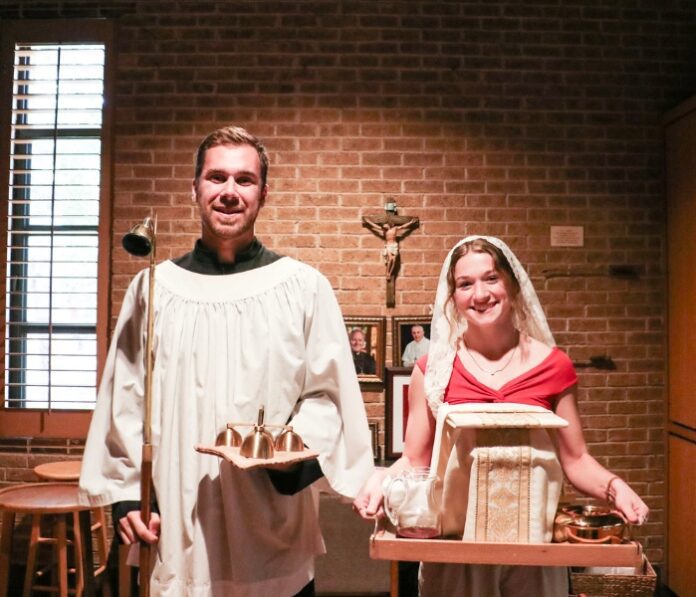Disclaimer: All articles published within the section of Commentary are opinions of the respective authors and do not necessarily reflect the opinions of the The Cor Chronicle.
We talk a lot about vocations within these bland brick walls, mostly concerning which state of life or occupation our Lord calls us to. But do we give thought to our vocation not just as students, but also as priests and prophets?
We may not have the authority to represent our Lord “in persona Christi capitis,” or “in the person of Christ the Head,” but we are all called to offer the sacrifice of the Mass from the pews. Another way in which we can offer our Masses and work to Christ is through being a liturgical minister.
The Church of the Incarnation provides a robust offering of Mass times and sacraments, and the staff needs help. It takes more than a suite of priests and our phenomenal liturgical director Karen Bless to make all those Masses happen.
There are many moving parts behind every daily Mass, and it all happens because of a small number of liturgical ministers. These ministers have a wonderful vocation that you might also be called to follow, and I pray that God calls more people to unite their work and prayer through these roles.
The Lector takes up the cross of Christ as a prophet. The Didache reminds us how highly those who speak the word of God should be esteemed. Hearing the Word is one thing. Reading it can also be very helpful. But the most potent way to actualize the Word of God in your life is to speak it. This makes the lectorship a powerful vocation.
“Sacristining”-working as a Sacristan- and altar serving are a lot of fun. There are many moving parts to the Mass; priests cannot do it alone. As a sacristan, you are responsible for setting up Mass and assisting in usher duties.
One of the best parts of being a sacristan is the sacristy conversations, which range from the theological to the absurd. Being a sacristan is one of the best ways to both serve the priests and to get to know them as the everyday men who live in the world with us.
The altar server picks up where the Sacristan leaves off and allows one to more closely offer the sacrifice of the Mass. By silently altar serving, you are an image to the congregation not of the Jesus Christ who preached in the Synagogues, but of the Jesus Christ who lived, prayed and worked in Nazareth, sweat -mingled with incense- and all.
Being an Extraordinary Minister is perhaps both the greatest responsibility and the greatest gift of all these vocations. Many seem afraid of the position because they feel deeply the tremendous responsibility of distributing communion. I understand, because I am inspired by the devotion on the faces that approach Jesus every time I am at Mass.
While there is great reverence to be made in receiving our Lord in various devout positions, are we to imagine that Jesus administered his body to the apostles on the tongue, paten under the chin and all, as the Fra Angelico fresco in the Convent of San Marco depicts? No! He served his body, reverently, with his body.
We are called to participate in that mystery. One of the greatest gifts for the extraordinary minister is contemplating the mystery that men and women who come to receive communion are made in the image and likeness of a God so humble that he became their daily bread. Being an Extraordinary Minister is a calling for the humble and the courageous who desire to sink their teeth deeply into the mysteries of our faith.
We need more liturgical ministers at the University of Dallas, especially altar servers and extraordinary ministers. With more altar servers, we could potentially have more candles and paten bearers. With more extraordinary ministers, we can have a more streamlined distribution of the Eucharist.
When you pray about your vocation, remember that we are all called to be, in our own little ways, priests, prophets and kings under Jesus Christ. Christ sacrificed himself to come to us, so let us be generous when we go to Mass in return. If you want to learn more about liturgical ministry or want to be trained, please email Karen Bless at kbless@udallas.edu.
Joseph Michel is a senior English and history major. He works in campus ministry and loves to volunteer as a liturgical minister.
